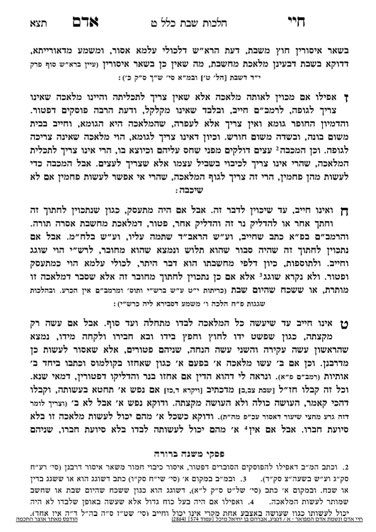We are beginning siman 9, where the Chayei Adam discusses the concept of performance of a full melacha versus performance of a partial melacha. We left off discussing the difference between the concept of performing a partial melacha, where one is patur mideoraysa, and chatzi shiur, where one is chayav mideoraysa.
The achronim suggest regarding certain melachos that there actually is a concept of chatzi melacha. In other words, in Rav Yochanan’s world (who holds chatzi shiur is assur, see shiur s289), a shiur is not an intrinsic part of the definition of the aveirah. There is a halacha l’Moshe miSinai that oneshim require shiurim, but aveiros do not. It is inherently considered an aveirah even if a person is eating less than a shiur. It is only the punishment which requires a shiur, but the aveirah applies even on the smallest amount. However, in certain cases, the shiur is an integral part of the aveirah, and without the shiur, it is not even an aveirah at all.
Thus, while If one is kotzair half a grogeres of wheat, they have transgressed the aveirah of kotzair, but it is not enough to be chayav for punishment, by these following examples, the shiur is an integral part of the aveirah.
For example,
- If one is carrying 4 amos in reshus harabim, or doing hotzaah from reshus hayachid to reshus harabim, but not finishing the melacha, such as only doing akira or hanacha, or only carrying two amos and not four.
- When it comes to tofair, the minimal shiur is two stitches. Chazal explain that one stitch is not enough to stitch two pieces of clothing together, and therefore the melacha is making two stitches.
- Some suggest that when it comes to the melacha of kosaiv, the mishnah says the minimum melacha is writing two letters. Some understand that the melacha performed in the mishkan was writing letters in pairs, so the shiur of two letters is inherent to the performance of the melacha.
- One is muttar medeoraysa for a chatzi melacha (and assur mederabanon), yet assur medeoraysa for a chatzi shiur.
- Hakal kal kodem is the concept that even when it is muttar to transgress an issur, it is preferable to transgress a lighter issur than a more chamur one.



